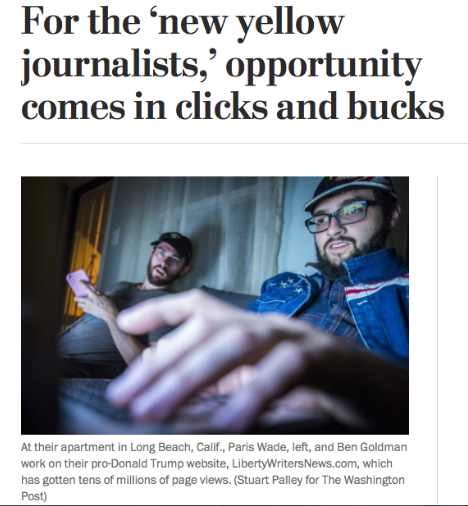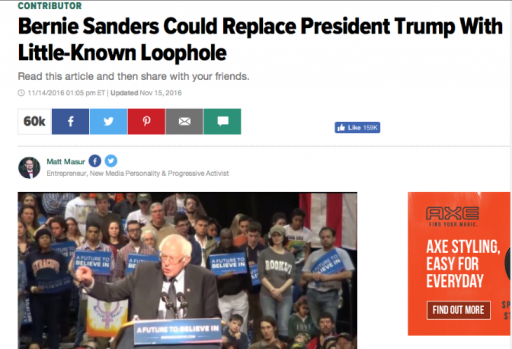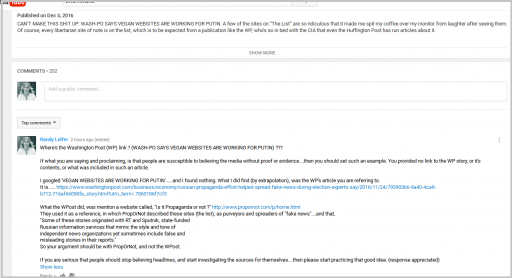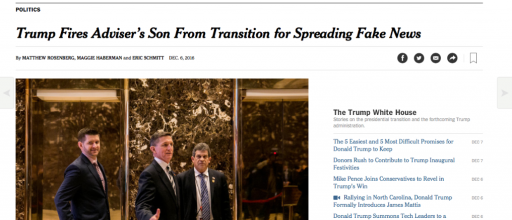MikeG
Senior Member.
The New York Times did an interesting piece on a fake story that was quickly debunked by Snopes and a few other sources, but illustrates the process of how quickly a combination of bad (or no) fact checking and social media can spread faulty information.

Tucker did little research to see if his claim was true or not. [My emphasis]
Two days after his original tweet on November 9th, Tucker posted a retraction with little success. The lack of an impact was actually measurable.
There has been an uptick in stories in fake news lately.
The Washington Post featured this story today.

https://www.washingtonpost.com/nati...-table-main_opportunists-633pm:homepage/story
And another story from the Washington Post on Alex Jones from last Friday:
https://www.washingtonpost.com/life...3dc190-ab3e-11e6-8b45-f8e493f06fcd_story.html
It seems that the linkages between the incoming Trump administration and conspiracy theories has focused more mainstream attention on the potentially serious consequences of fake, faulty, and poorly researched ideas.
This process is old hat for Metabunk, but it seems apparent that a larger discussion is now taking place.
I see that as a good trend or at least I hope it is. Time will tell.

http://www.nytimes.com/2016/11/20/b...e-region®ion=top-news&WT.nav=top-news&_r=0Eric Tucker, a 35-year-old co-founder of a marketing company in Austin, Tex., had just about 40 Twitter followers. But his recent tweet about paid protesters being bused to demonstrations against President-elect Donald J. Trump fueled a nationwide conspiracy theory — one that Mr. Trump joined in promoting.
Mr. Tucker's post was shared at least 16,000 times on Twitter and more than 350,000 times on Facebook. The problem is that Mr. Tucker got it wrong. There were no such buses packed with paid protesters.
But that didn't matter.
Tucker did little research to see if his claim was true or not. [My emphasis]
http://www.nytimes.com/2016/11/20/b...e-region®ion=top-news&WT.nav=top-news&_r=0Mr. Tucker said he had performed a Google search to see if any conferences were being held in the area but did not find anything. (The buses were, in fact, hired by a company called Tableau Software, which was holding a conference that drew more than 13,000 people.)
“I did think in the back of my mind there could be other explanations, but it just didn’t seem plausible,” he said in an interview, noting that he had posted as a “private citizen who had a tiny Twitter following.”
He added, “I’m also a very busy businessman and I don’t have time to fact-check everything that I put out there, especially when I don’t think it’s going out there for wide consumption.”
But it was too late. A combination of social media and conspiracy sites took off with the story.
Two days after his original tweet on November 9th, Tucker posted a retraction with little success. The lack of an impact was actually measurable.
http://www.nytimes.com/2016/11/20/b...e-region®ion=top-news&WT.nav=top-news&_r=0After midnight Mr. Tucker deleted his original tweet, then posted an image of it stamped with the word “false” for posterity. It did not receive much attention.
After a week, that message had 29 retweets and 27 likes. The Snopes article has been shared about 5,800 times according to its website, a fraction of the number for the fake version of the news. Faced with the impact of his initial tweet, Mr. Tucker, who now has about 960 Twitter followers, allowed himself a moment of reflection.
There has been an uptick in stories in fake news lately.
The Washington Post featured this story today.

https://www.washingtonpost.com/nati...-table-main_opportunists-633pm:homepage/story
And another story from the Washington Post on Alex Jones from last Friday:
https://www.washingtonpost.com/life...3dc190-ab3e-11e6-8b45-f8e493f06fcd_story.html
It seems that the linkages between the incoming Trump administration and conspiracy theories has focused more mainstream attention on the potentially serious consequences of fake, faulty, and poorly researched ideas.
This process is old hat for Metabunk, but it seems apparent that a larger discussion is now taking place.
I see that as a good trend or at least I hope it is. Time will tell.





